Ford Kuga vs Land Rover Range Rover Velar - Differences and prices compared
Compare performance (243 HP vs 404 HP), boot space and price (34200 £ vs 61900 £ ) at a glance. Find out which car is the better choice for you – Ford Kuga or Land Rover Range Rover Velar?
Costs and Efficiency:
Price and efficiency are often the first things buyers look at. Here it becomes clear which model has the long-term edge – whether at the pump, the plug, or in purchase price.
Ford Kuga has a clearly advantage in terms of price – it starts at 34200 £ , while the Land Rover Range Rover Velar costs 61900 £ . That’s a price difference of around 27643 £.
Fuel consumption also shows a difference: Ford Kuga manages with 2.80 L and is therefore clearly more efficient than the Land Rover Range Rover Velar with 4.80 L. The difference is about 2 L per 100 km.
As for electric range, the Ford Kuga performs barely noticeable better – achieving up to 68 km, about 5 km more than the Land Rover Range Rover Velar.
Engine and Performance:
Under the bonnet, it becomes clear which model is tuned for sportiness and which one takes the lead when you hit the accelerator.
When it comes to engine power, the Land Rover Range Rover Velar has a evident edge – offering 404 HP compared to 243 HP. That’s roughly 161 HP more horsepower.
In acceleration from 0 to 100 km/h, the Land Rover Range Rover Velar is distinct quicker – completing the sprint in 5.40 s, while the Ford Kuga takes 7.30 s. That’s about 1.90 s faster.
In terms of top speed, the Land Rover Range Rover Velar performs slightly better – reaching 250 km/h, while the Ford Kuga tops out at 200 km/h. The difference is around 50 km/h.
There’s also a difference in torque: Land Rover Range Rover Velar pulls clearly stronger with 650 Nm compared to 240 Nm. That’s about 410 Nm difference.
Space and Everyday Use:
Beyond pure performance, interior space and usability matter most in daily life. This is where you see which car is more practical and versatile.
Both vehicles offer seating for 5 people.
In curb weight, Ford Kuga is evident lighter – 1526 kg compared to 2003 kg. The difference is around 477 kg.
In terms of boot space, the Land Rover Range Rover Velar offers clearly perceptible more room – 552 L compared to 412 L. That’s a difference of about 140 L.
In maximum load capacity, the Ford Kuga performs to a small extent better – up to 1534 L, which is about 176 L more than the Land Rover Range Rover Velar.
When it comes to payload, Land Rover Range Rover Velar slight takes the win – 587 kg compared to 550 kg. That’s a difference of about 37 kg.
Who wins the race?
The Land Rover Range Rover Velar proves to be barely ahead and therefore becomes our DriveDuel Champion!
Land Rover Range Rover Velar is the better all-rounder in this comparison.
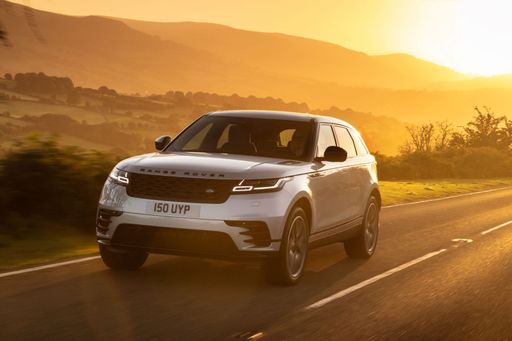
Land Rover Range Rover Velar
Costs and Consumption
View detailed analysis
Engine and Performance
View detailed analysis
Dimensions and Body
View detailed analysis
Ford Kuga
The Kuga is Ford’s adaptable family SUV that blends usable space with a surprisingly lively driving character, making daily commutes and weekend escapes equally enjoyable. With smart interior packaging, an easy-to-use infotainment setup and composed road manners, it’s a sensible choice for buyers who want a bit of fun without the fuss.
details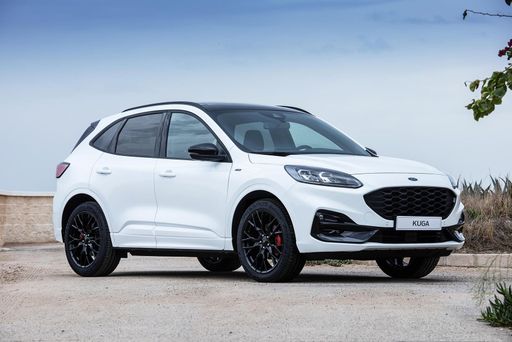
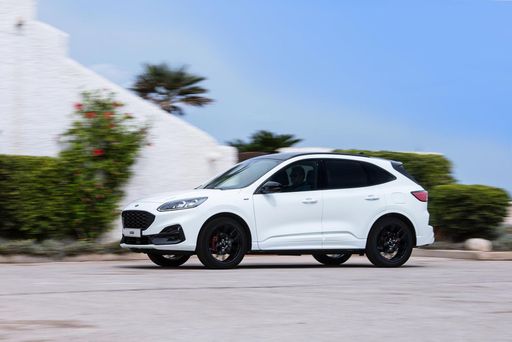

Land Rover Range Rover Velar
The Range Rover Velar marries sleek, pared-back styling with genuine off-road poise, so it looks at home in the city yet won’t flinch at rougher roads. Inside, a luxurious, tech-forward cabin pampers occupants while keeping the driving experience confidently in command — and yes, it somehow makes an SUV feel undeniably chic.
details
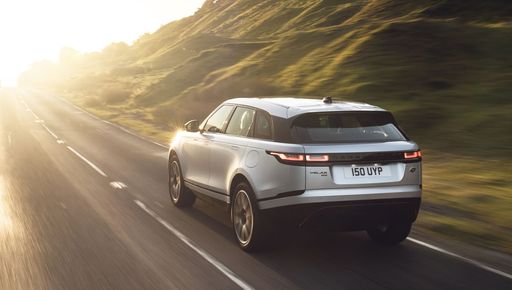
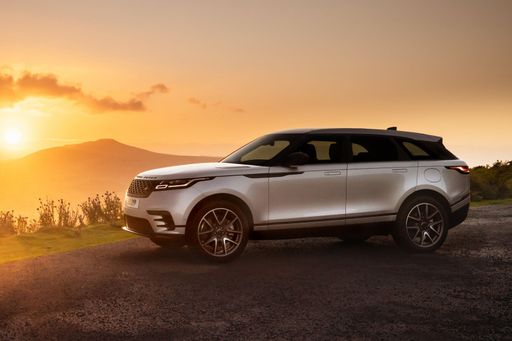
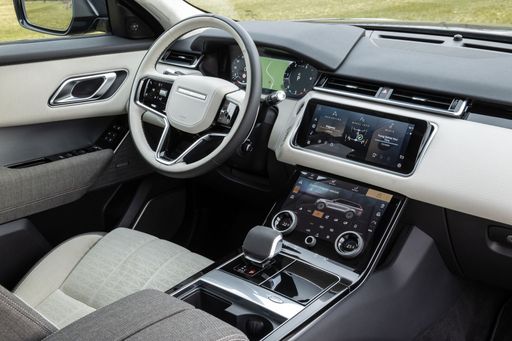
Costs and Consumption |
|
|---|---|
|
Price
34200 - 46300 £
|
Price
61900 - 87400 £
|
|
Consumption L/100km
2.8 - 6.8 L
|
Consumption L/100km
4.8 - 10.2 L
|
|
Consumption kWh/100km
-
|
Consumption kWh/100km
-
|
|
Electric Range
68 km
|
Electric Range
63 km
|
|
Battery Capacity
1.1 - 14.4 kWh
|
Battery Capacity
15.40 kWh
|
|
co2
55 - 154 g/km
|
co2
110 - 232 g/km
|
|
Fuel tank capacity
42 - 54 L
|
Fuel tank capacity
62 - 83 L
|
Dimensions and Body |
|
|---|---|
|
Body Type
SUV
|
Body Type
SUV
|
|
Seats
5
|
Seats
5
|
|
Doors
5
|
Doors
5
|
|
Curb weight
1526 - 1859 kg
|
Curb weight
2003 - 2280 kg
|
|
Trunk capacity
412 L
|
Trunk capacity
503 - 552 L
|
|
Length
4604 - 4645 mm
|
Length
4797 mm
|
|
Width
1882 mm
|
Width
1933 mm
|
|
Height
1673 - 1681 mm
|
Height
1657 - 1665 mm
|
|
Max trunk capacity
1534 L
|
Max trunk capacity
1335 - 1358 L
|
|
Payload
541 - 550 kg
|
Payload
460 - 587 kg
|
Engine and Performance |
|
|---|---|
|
Engine Type
Petrol, Full Hybrid, Plugin Hybrid
|
Engine Type
Petrol MHEV, Plugin Hybrid, Diesel MHEV
|
|
Transmission
Manuel, Automatic
|
Transmission
Automatic
|
|
Transmission Detail
Manual Gearbox, CVT, Automatic Gearbox
|
Transmission Detail
Automatic Gearbox
|
|
Drive Type
Front-Wheel Drive, All-Wheel Drive
|
Drive Type
All-Wheel Drive
|
|
Power HP
150 - 243 HP
|
Power HP
204 - 404 HP
|
|
Acceleration 0-100km/h
7.3 - 9.9 s
|
Acceleration 0-100km/h
5.4 - 8.3 s
|
|
Max Speed
195 - 200 km/h
|
Max Speed
209 - 250 km/h
|
|
Torque
240 Nm
|
Torque
430 - 650 Nm
|
|
Number of Cylinders
3 - 4
|
Number of Cylinders
4 - 6
|
|
Power kW
111 - 178 kW
|
Power kW
150 - 297 kW
|
|
Engine capacity
1496 - 2488 cm3
|
Engine capacity
1997 - 2997 cm3
|
General |
|
|---|---|
|
Model Year
2025
|
Model Year
2025
|
|
CO2 Efficiency Class
E, D, B
|
CO2 Efficiency Class
G, C
|
|
Brand
Ford
|
Brand
Land Rover
|
What drivetrain options does the Ford Kuga have?
The Ford Kuga is available as Front-Wheel Drive or All-Wheel Drive.




